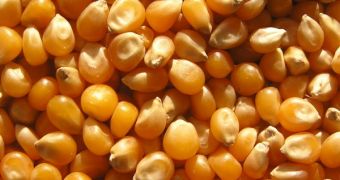Giant agriculture company Monsanto announced on Wednesday that its “drought-tolerant” corn was in the latest stage of development, and that it could become readily available for the international markets as early as next year. The announcement added that this was part of the corporation's bid to help farmers in the coming decades, as water supplies dwindle worldwide, and an ever-increasing population places larger pressures on food production units, such as farms and animal ranches.
"Drought-tolerant corn is designed to provide farmers yield stability during periods when water supply is scarce by mitigating the effects of drought – or water stress – within a corn plant." This will "enable farmers to produce more on each acre of farmland while minimizing the input of energy and resources such as water," the company said.
Monsanto's biotechnology chief, Steve Padgette, added that "This product and other yield improvements we are developing will reset the bar for on-farm productivity," saying that tests conducted last year in areas of the Midwest usually subjected to droughts showed that the plants performed well, and that production increased by as much as 10 corn bushels per acre (six quintals per hectare), compared to the average maximum yield those fields usually produced.
This product could be good news for people living in very poor areas of the world, such as Africa and India, where the food supplies are insufficient and very expensive, although the Rome-based UN Food Agency announced just recently that the global food production increased by more than 5.4 percent in 2008 alone, to a record of 2.24 billion tons of cereals.
The only thing that could now stand in Monsanto's way is the raising wave of international criticism the company has been facing in the last few years. Worldwide, farmers and environmental organizations say that the corporation sells seeds that are infertile, meaning that they cannot be planted to produce offspring, forcing the growers to purchase new batches every year.
Also, farmers in the US refer to the company as “Gestapo,” because it files suit against them for allegedly creating their own corn strains. But the way in which the company gets its evidence is questionable, people say, as it often involves trespassing on private property and direct collection of samples.

 14 DAY TRIAL //
14 DAY TRIAL //